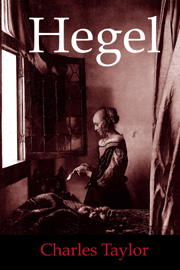Book contents
- Frontmatter
- Contents
- Preface and Acknowledgements
- Abbreviations
- German words used in text
- PART I THE CLAIMS OF SPECULATIVE REASON
- PART II PHENOMENOLOGY
- PART III LOGIC
- PART IV HISTORY AND POLITICS
- PART V ABSOLUTE SPIRIT
- PART VI CONCLUSION
- XX Hegel Today
- Biographical Note
- Bibliography
- Analytical list of main discussions
- Index
XX - Hegel Today
Published online by Cambridge University Press: 05 June 2012
- Frontmatter
- Contents
- Preface and Acknowledgements
- Abbreviations
- German words used in text
- PART I THE CLAIMS OF SPECULATIVE REASON
- PART II PHENOMENOLOGY
- PART III LOGIC
- PART IV HISTORY AND POLITICS
- PART V ABSOLUTE SPIRIT
- PART VI CONCLUSION
- XX Hegel Today
- Biographical Note
- Bibliography
- Analytical list of main discussions
- Index
Summary
This magnificent Hegelian synthesis has dissolved. After achieving an extraordinary ascendancy over the German intellectual world in the 1820s and 1830s, it began to wane a decade after his death in 1831. We think of the 1840s as the great age of rebellion against the Hegelian system, the age of the Young Hegelians, Feuerbach, Ruge, Stirner, Marx, the time also when Kierkegaard began his short, intense intellectual career.
But to be the object of virulent attack by a generation of young thinkers is still to be very much on the agenda. Much worse was in store for Hegel's absolute idealism. In the 1850s and 1860s it fell into virtual oblivion. Hegel was vaguely remembered in Bismarckian Germany as the state philosopher of ‘Restoration’ Prussia, and peripherally approved of or vilified in consequence. There is an amusing bit of correspondence between Marx and Engels of the 1870s in which they give vent to their impatience at the ignorance of the younger generation. The occasion was a footnote by a young Social- Democratic editor in which he referred to Hegel as the philosopher of the ‘royal Prussian Idea of the state’. The incident illustrates how much the Hegelian roots of Marx and Engels' thought came to be misunderstood even in their own movement.
Hegel, of course, made a ‘comeback’ in Germany towards the end of the century. Lasson's critical work in producing new, more scholarly editions of his work stimulated and was stimulated by this renewed interest.
- Type
- Chapter
- Information
- Hegel , pp. 537 - 571Publisher: Cambridge University PressPrint publication year: 1975
- 2
- Cited by

